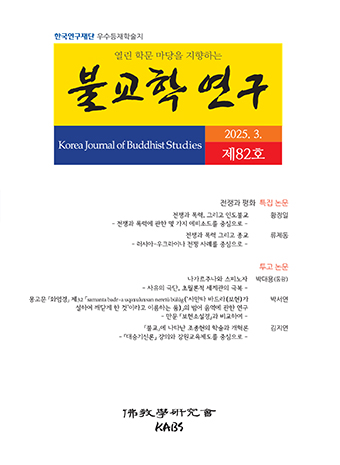Abstract
References
Sorry, not available.
Click the PDF button.
Information
This study has been put an effort to analyze the consideration of the self as reflected in the Early Buddhism and has taken into consideration of the position of the Buddhism related to the relation between the body and the mind and axiological position that has been a hot issue in the field of philosophy society for a long time.Until now, the Undeclared(the avyākṛta) has been understood the thought that Buddha refused the discussion on the subject of the relation between the body and the mind. The writer first revealed the point of view that Buddha's the Undeclared must be considered as the refusal of discussion in the form of proposal of a question about the attitude to the question maker who tries to obtain an affirmative opinion about the topic. Therefore, I think, the legitimacy on the Buddhist discussion between the relation between the body and the mind has been established.In the Early Buddhism, it was said that human beings were made up of the body and the mind, but the body and the mind had no real substantiality. The phenomenological existence of the body and the mind was not denied, in this sense both of them have same equivalence in ontology. In addition, they also have same equivalence in relations in that either of them is not able to have an one-way effect on the other. Accordingly, the axiological prospect shall not be established in the given framework of the relation between the body and the mind.When seen from the viewpoint of the Buddhism, what leads us to suffering is evil, but what takes us out of suffering is good. Suffering arises when we lacks in righteous recognition to the things, and this suffering is closely related to defilement of the mind. If the mind gets defiled(bonded),suffering arises therefore, and if the mind is purified(released), the suffering will disappear. Therefore, axiological argument about the relation between the body and the mind cannot help being converted into the framework, the relation between the mind and the mind.The reason that the mind was put more importance on in the Early Buddhism gets down to that the body distorted by all types of mistakes and errors resulted by the mind can only be cured by the mind itself. Nevertheless, we should not suppose that there is a certain type of substance such as a pure mind. Once we have a consciousness that our mind is already clean, we can't get away from the separatory consciousness, at the same time our consciousness will be divided again to lose peacefulness in our mind. Our effort to have pure mind and remove defiled mind will be nothing but creating a big root of lust and hatred. When removing defiled mind, we have to say that we are going back to the original state of our body and mind.
Click the PDF button.
- Publisher :Korean Association of Buddhist Studies
- Publisher(Ko) :불교학연구회
- Journal Title :Korean Journal of Buddhist Studies
- Journal Title(Ko) :불교학연구
- Volume : 13
- Pages :181~210


 Korean Journal of Buddhist Studies
Korean Journal of Buddhist Studies






